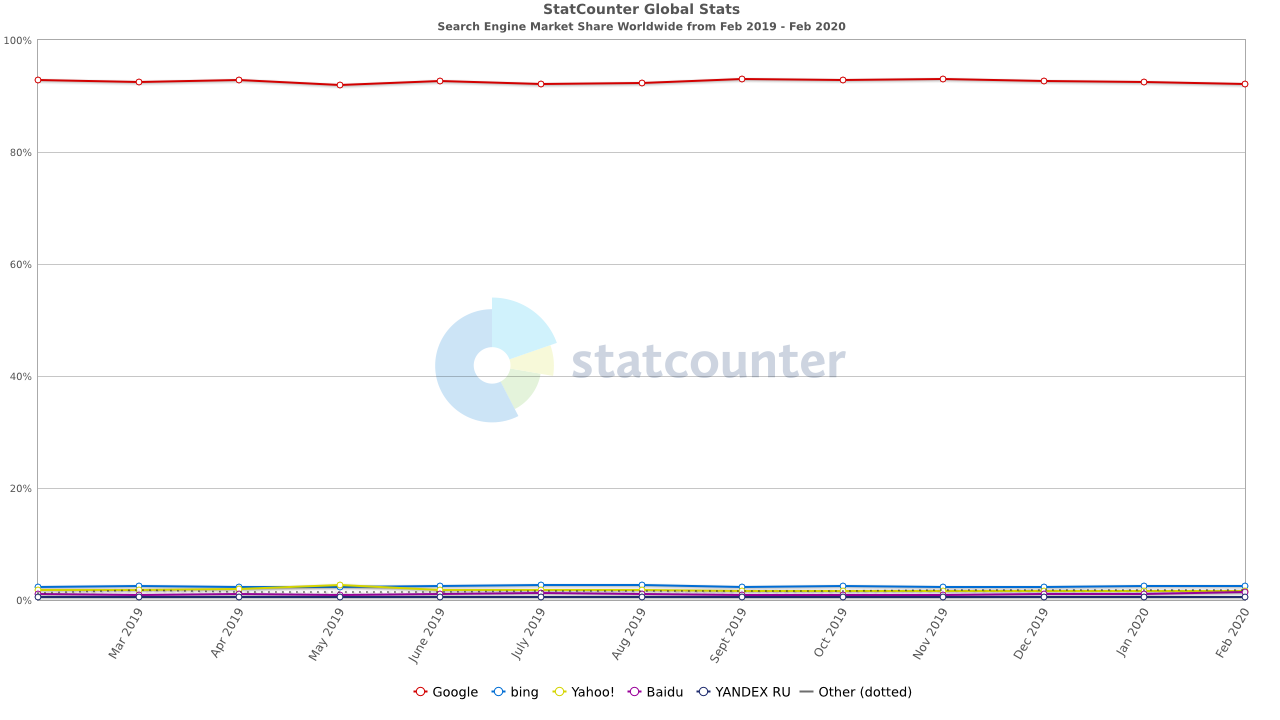Steph W. from SEOPressor


...help you check your website and tell you exactly how to rank higher?


83
score %
SEO Score

Found us from search engine?
We rank high, you can too.
SEOPressor helps you to optimize your on-page SEO for higher & improved search ranking.
By jiathong on July 7, 2020

It is 2020 and Google remains the uncontested king of all Search Engines. How true is this statement? Well, Google commands a whopping 92.07 % of the Search Engine Market Share across the globe. This places Bing, Yahoo, Baidu, YANDEX RU, and Sogou at 2.44%, 1.62%, 1.49%. 0.54% and 0.43% respectively as per November 2019.

That being said, your knowledge of how search engines work will give you an edge over other SEO professionals. This knowledge will help you understand the best ways to get a better ranking, especially in Google SERPs. That explains why Google search operators help SEO professionals to stay ahead of the competition.
In fact, you can use google search operators to make your work more efficient. For instance, you may filter out more than 90% of simple mentions when gauging the content dedicated to certain topics. To make you have a clear picture of what this means, you can use an advanced operator to move from 801 million (in 0.60 seconds) search results to a more specific 16 million results in just 0.51 seconds.
Now the question is, “How do you accomplish more by using relevant search operators?” Read on to find out more about Google Search Operators and how you can put them in action.
Google search operators help you find your way around certain websites. They enable you to narrow down your search in a matter of seconds. Let’s look at some common search operators.
When it comes to searching for different sites, you need to limit the search on one site. You can just carry out a general search first to have several options that you can choose from. So after doing a general search, you may check to verify if the indexed web pages match with your database.
In other words, if you are looking for more specific search results for a single website, this search operator will help you find those results easily. Let’s say you want to look up your favorite SEO web page for information on 404 errors. Most likely, you will use the following:
The site helps you in the following way:
More often than not, the source is referred to as the “sister” operator of the site. It enables you to select specific sources in Google News. It plays a crucial role when citing specific news sources. And this is a common trend when writing news pieces.
The source helps you to achieve the following:
Here’s an example when you’re only looking for news from CNN:

Intext is a global operator that forces Google to show you pages that includes that specific word, wherever that can be.
You need this when:
The best use case scenario is to use it in conjunction with source or site.
Here is a perfect example of Intext:

The intittle helps Google to know that you want results from pages that include the search terms in meta title tags. In simple terms, this operator makes it easy for you to know the number of pages targeting specific search phrases.
The intittle is used to do the following tasks:
Below is an example of an intitle:

Similar to intitle only that all words in the query are in the title tags of all the results. Unlike intitle where sometimes you won’t get exact match of your keywords in the results returned.
Take it this way: if you sold several AirPods on your eCommerce website, you could use allintitle to search for other sites that have the term “AirPods” in their titles. In essence, this is an efficient way to find your direct competition.
You can use the allintitle to do the following:
Example:

Just like the Intext and Intitle, the Inurl allows Google to only give back the results with which the search words are in the URL. This operator helps you reduce the search volume. As such, it is quite useful in finding direct competitors.
This also helps you see the effectiveness of having a certain keyword in the URL in SEO compared to those that don’t. By comparing the search result with and without the operator.
In other words, Inurl plays a significant role in the following ways:
This search operator ensures that all words in the query are in the URL so that they may become a result. In the case of a long search phrase, the Allinurl gives back only a handful of results or nothing at all.
The Allinurl is useful in the following way:
In this example, we want results for Apple AirPods pro only, instead of the regular AirPods.
As the name suggests, the file type only instructs Google to give the results of a particular type of file. It’s suitable when searching for information in PDF or documents in file formats and not HTML.
For content creators, you know whatever PDF your competitors put up will have juicier content compared to the plain old blog posts. Use that to your advantage.
Filetype is applicable in the following task:

Here is another search operator that enables you to search the websites related to specific URLs. You can use it as an illuminating tool into how Google classifies your site and your competitors’.
Related is mainly used to:
AROUND (X) helps you limit results to webpages containing search words that fall within X words (of each other). Suitable for finding song lyrics and quotes you don’t remember.
With this search operator, Google will bold some of the phrases you are looking for and not just any search word.
AROUND(X) is useful as follows:
The purpose of Google’s search operator is to filter and specify the results coming from your search. At this point you should be familiar with the following symbols as used by Google:
Placing your search term within quotes indicates the exact match search for a particular phrase.
For that reason, the exact term or phrase in that particular order should be on the web page. But using quotes on single word excludes related words and synonyms.
Example: “Elon Musk’s Outrageous Tweets Compilation”
Take note that Google will look for results related to all terms in the search fields.
In fact, Google’s algorithm will make a correct estimation depending on whether it is just a phrase or several separate terms. This makes AND to become redundant.
Example: SEO AND content.
The main function of a hyphen in the basic search operators is to make you exclude some words from the search queries. Take this practical example; you want to look up the phrase, “SEO California”. So you will have to exclude “LA”.
The hyphen will prevent the search engine from giving you results from the entire city of California.
Example: SEO California-Los-Angeles-LA
The work of an asterisk is to inform Google to fill in the “blanks”. It works similarly as AROUND (X) although it doesn’t let you specify the maximum length of your phrase. Nevertheless, it is quite handy in finding phrases and quotes.
Example: Elon*Tesla
Brackets place together different terms of search operators to structure a more advanced search.
Example: allinurl: SEO (San Diego OR Los Angeles OR San Francisco).
OR/| informs Google that a certain phrase or word can be swapped with another. You can use this combination of basic search operators with brackets to make it more effective.
Example: Bezos Or musk; Bezos|musk
This search operator enables you to look up products and services by price.
Example: iPhone 8 + 450$
Two numbers separated by two dots tell Google to go back to the searches for information within that particular year range.
Example: Ted Talks207..202
Basically, these are some of the useful search operators you need to know. Knowledge of them will enable you to have an easy time while searching for words and phrases on Google.
As SEO tools and APIs get more sophisticated and complicated, it is never too late to go back to your roots as SEOs. Through the use of the Google search operators, you will get first-hand information as a consumer while working to solve SEO problems for yourself or your clients.
In the end, you will have the required skills to instantly check and improve your SEO in the comfort of your seat. And you can only accomplish this through useful search operators in use today.
Updated: 2 July 2025


Save thousands of dollars (it’s 100x cheaper)

Zero risk of Google penalty (it’s Google-approved)

Boost your rankings (proven by case studies)
Rank High With This Link Strategy
Precise, Simplified, Fast Internal Linking.
